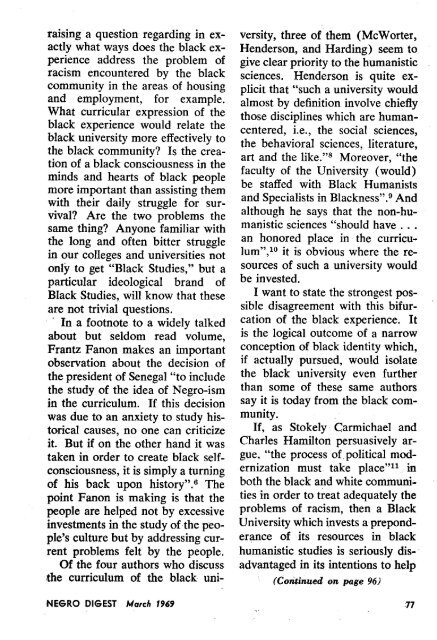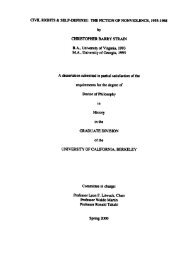Negro Digest - Freedom Archives
Negro Digest - Freedom Archives
Negro Digest - Freedom Archives
Create successful ePaper yourself
Turn your PDF publications into a flip-book with our unique Google optimized e-Paper software.
aising a question regarding in exactly<br />
what ways does the black experience<br />
address the problem of<br />
racism encountered by the black<br />
community in the areas of housing<br />
and employment, for example .<br />
What curricular expression of the<br />
black experience would relate the<br />
black university more effectively to<br />
the black community? Is the creation<br />
of a black consciousness in the<br />
minds and hearts of black people<br />
more important than assisting them<br />
with their daily struggle for survival?<br />
Are the two problems the<br />
same thing? Anyone familiar with<br />
the long and often bitter struggle<br />
in our colleges and universities not<br />
only to get "Black Studies," but a<br />
particular ideological brand of<br />
Black Studies, will know that these<br />
are not trivial questions .<br />
' In a footnote to a widely talked<br />
about but seldom read volume,<br />
Frantz Fanon makes an important<br />
observation about the decision of<br />
the president of Senegal "to include<br />
the study of the idea of <strong>Negro</strong>-ism<br />
in the curriculum . If this decision<br />
was due to an anxiety to study historical<br />
causes, no one can criticize<br />
it. But if on the other hand it was<br />
taken in order to create black selfconsciousness,<br />
it is simply a turning<br />
of his back upon history" .° The<br />
point Fanon is making is that the<br />
people are helped not by excessive<br />
investments in the study of the people's<br />
culture but by addressing current<br />
problems felt by the people .<br />
Of the four authors who discuss<br />
,the curriculum of the black uni-<br />
NEGRO DIGEST March 1969<br />
versity, three of them (McWorter,<br />
Henderson, and Harding) seem to<br />
give clear priority to the humanistic<br />
sciences . Henderson is quite explicit<br />
that "such a university would<br />
almost by definition involve chiefly<br />
those disciplines which are humancentered,<br />
i.e., the social sciences,<br />
the behavioral sciences, literature,<br />
art and the like ."g Moreover, "the<br />
faculty of the University (would)<br />
be staffed with Black Humanists<br />
and Specialists in Blackness" .s And<br />
although he says that the non-humanistic<br />
sciences "should have . . .<br />
an honored place in the curriculum",1°<br />
it is obvious where the resources<br />
of such a university would<br />
be invested .<br />
I want to state the strongest possible<br />
disagreement with this bifurcation<br />
of the black experience . It<br />
is the logical outcome of a narrow<br />
conception of black identity which,<br />
if actually pursued, would isolate<br />
the black university even further<br />
than some of these same authors<br />
say it is today from the black community<br />
.<br />
If, as Stokely Carmichael and<br />
Charles Hamilton persuasively argue,<br />
"the process of, political modernization<br />
must take place"~l in<br />
both the black and white communities<br />
in order to treat adequately the<br />
problems of racism, then a Black<br />
University which invests a preponderance<br />
of its resources in black<br />
humanistic studies is seriously dis<br />
advantaged in its intentions to help<br />
(Coruinued on page 96)<br />
77
















